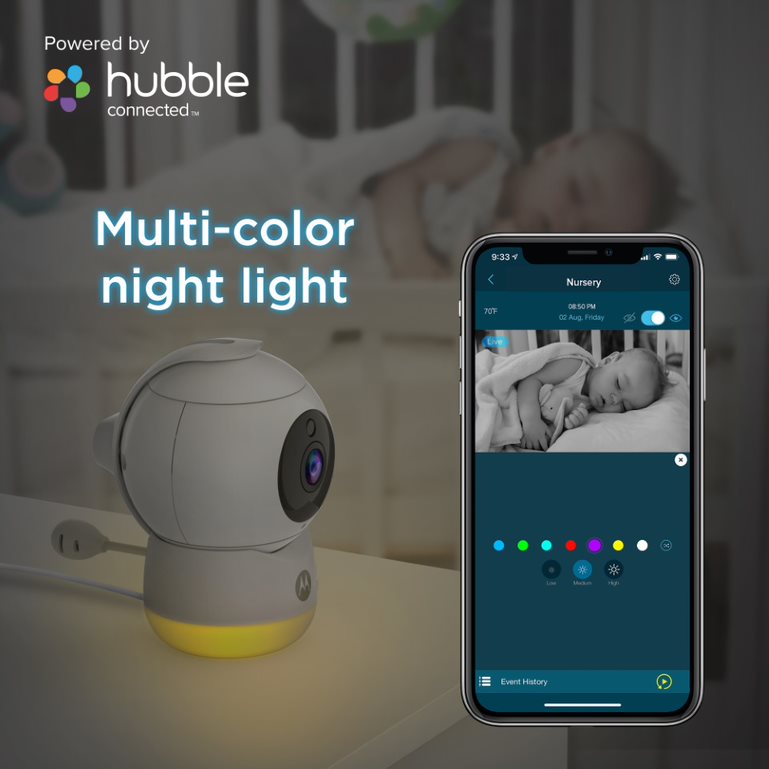So you’re having a baby – congratulations! Now that everyone knows, it’s time to start getting your nursery stocked – but what do you truly need?
You only have nine months to get ready before that little bundle of joy comes home. As a mom of twins, I’ve had my fair share of trials and failures when it comes to baby products.
Some baby products you know are essentially basics, and others turn out to be just space fillers in your nursery and don’t get used often.
There are some products that can be considered luxuries, and others are items that you absolutely can’t live without.
Baby Nursery Must-Haves
These items below are great to have on hand before your little one arrives, saving you a late night trip to the store at the last minute for necessities.
Below is a list of 36 things every baby nursery needs.
1. Diapers
Diapers are the staple of every nursery – it’s literally the first thing that is put on your baby after it is born.
It’s a good idea to have at least three packs of size newborn and three packs of size one diapers to start off, and build up your stock.
Diaper showers are popular theme showers and a way to get your stash built up before your baby arrives.
Make sure to keep any gift receipts so if one size is outgrown, they can be exchanged for a larger size.
2. Wipes
Baby wipes are necessary for cleaning not only baby bottoms, but baby hands and baby faces. In a pinch, they can be used for quick baths as well.
Some babies have sensitive skin, so unscented wipes may be a good first pick for fresh baby skin.
3. Pacifiers
Noo-noos, binkies, pacis, ba-bas… whatever you call them in your house, a pacifier can be a lifesaver for a fussy baby.
Keep a few different brands on hand, in case your baby needs to try several before settling on a favorite.
For safety reasons, make sure to size up as baby grows to avoid a choking hazard.
4. Bottles
If you choose to bottle feed, bottles and nipples are a must.
Your baby may have a preference to a certain brand, so you may need to have several on hand in order to find out which one is their favorite.
5. Formula
If you are formula feeding, the hospital will send you home with a several days’ supply of formula.
You can always check with your baby’s pediatrician for samples to last until you can get to the store to purchase a larger supply.
Always check with your pediatrician before making any changes to your baby’s formula type.
6. Formula Blender
A large formula blender is a nice luxury, but it is not a necessity – a small handheld formula blender that is battery operated will do the job just as well.
It mixes formula efficiently without a lot of air bubbles and can be rinsed off in the sink quickly and easily.
7. Formula Mixing Pitcher
As a twin mom, I mixed large batches of formula in advance and stored it in the refrigerator each day.
A formula mixing pitcher allowed me to mix large quantities at one time and pour it into bottles, rather than mixing bottles individually. Huge time saver!
8. Breast Pump
If you choose to breastfeed, a breast pump will be essential. Choose a good quality pump – many insurance companies will provide one, or one can be rented from the hospital where you deliver.
A pump will allow you to store breastmilk and give others a chance to feed the baby when you may not be available.
9. Microwave Sterilizer
Whether you breastfeed or bottle feed, a microwave sterilizer will come in handy for both bottle parts and breast pump parts.
Simply pop it in the microwave with a bit of water and in just a few minutes, your parts are clean, sterilized, and ready for use.
10. Gowns
One piece dressing gowns are the simplest clothing to use for babies in the first few weeks of life – they are easy for diaper changing, especially in the middle of the night – no snaps or zippers to contend with!
Many gowns also have small cuffs that fold over the hands, helping to keep your baby from scratching their face.
11. Footed Sleepers
When your baby is a little older, footed sleepers will come in handy!
One piece outfits are easy for lounging around at home – no need for trying to keep up with socks that keep falling off or shoes that keep getting lost.
12. Baby Clothing Hangers
Baby sized clothing hangers are perfectly sized for infant clothing. Child sized hangers are too big and will tend to stretch out the shoulders of shirts and outfits.
Onesies and other smaller items can be hung upside-down on hangers, snapped at the bottom, for ease of storage.
13. Bassinette
Your baby will need a small bassinette or co-sleeper to sleep safely and soundly.
These small sleepers ensure that your baby will be within arm’s reach of you yet safely in their own sleeping environment.
14. Crib
When your baby outgrows its bassinette, it will need a standard size crib to sleep in.
Whether it is a new one or a hand-me-down crib, make sure it has not been recalled and adheres to current safety guidelines.
15. Crib Mattress
A waterproof crib mattress is a must! Diapers leak, babies spit up, accidents happen – and you don’t want to be dealing with a soaking wet mattress in the middle of the night.
A waterproof mattress with a mattress protector/liner will definitely save time with sheet changes if any accidents do happen.
16. Crib Sheets
Multiple crib sheets are another must have. Well fitting sheets that are elasticized all the way around the hem will help prevent slippage when your baby is rolling around in the middle of the night.
17. Car Seat
This is absolutely essential – your baby needs to be able to be transported safely! Make sure this is purchased prior to your baby being born, and is brought with you to the hospital before you deliver.
Your hospital staff will make sure that you can strap your baby in safely before being discharged.
18. Stroller
A stroller will save your arms from the strain of lugging a car seat around, especially as your baby gains weight and grows.
Whether it is a stroller that the car seat can pop in and out of easily, or it is one that your baby can sit in independently, find one that you can steer smoothly and can be removed in and out of the trunk of your car easily.
19. Thermometer
A thermometer is essential for when you think your baby may be sick. It’s the best screening tool you can use, and sometimes a fever will be the deciding factor on if your baby needs to see a doctor or not.
Make sure you purchase a good quality one and know how to use it correctly.
20. Receiving blankets
You can never have too many receiving blankets! Whether they are used for swaddling your baby, or spread out on the floor for tummy time, always have several clean and on hand.
21. Burp cloths
Again, you can never have too many of these on hand. Some days it may seem like you will go through a dozen burp cloths.
They are perfect for tossing over your shoulder, your forearm, your leg, or anywhere your baby may randomly spit up on you. These have been known to save many an outfit!
22. Teething rings
When tossed in a freezer, teething rings can provide hours of comfort for swollen gums. They are the perfect non-medicated relief for fussy teething babies.
23. Cool Mist Humidifier
A cool mist humidifier provides relief for stuffy noses and coughs for little ones when allergies or colds strike.
It puts humidity back into the air, especially during the winter, when running a heater dries out the air in our homes.
Make sure to change the water in it frequently to avoid any mold or mildew growth.
24. Fingernail Clippers
Tiny baby fingernails can be as sharp as daggers and can scratch delicate facial skin. Fingernail clippers – baby sized – are perfect for giving your baby a mini manicure.
25. Diaper Rash Cream
We all wish that diaper rashes never existed. But because they do, keep a tube of diaper rash cream on hand for those rashes that pop up unexpectedly.
26. Nasal Aspirator
The hospital will probably send you home with a bulb-shaped nasal aspirator, but keep another one on hand at home for sucking out snot, congestion, boogers and all those other little lovely things that like to live in babies’ noses.
27.Saline Nasal Drops
These are the best friend of the nasal aspirator – when congestion is thick, a few drops of saline will help loosen up congestion and help the snot come out easier.
28. Hand Sanitizer
Keeping germs away from your new little one is one of the best things you can do to protect their health.
Having any visitors sanitize their hands before holding them is the best thing you can do to protect them from any germs that may be present.
29. Swing
An infant swing is an investment that is worth every penny. It can be used for many months and even handed down to younger babies-to-come.
Swings that plug in rather than ones that use batteries can be more cost efficient.
30. Tummy Time Mat
A tummy time or play mat is good for implementing tummy time when your baby is able to hold its head up sufficiently.
There are several on the market that have toy attachments or arches that secure to the corners, providing visual stimulation.
31. Pacifier Clip
If you are forever losing pacifiers, a pacifier clip helps keep them from getting lost. These clip to clothing on one end and the pacifier attaches to the other.
They can be ordered from various boutiques or shops online, or can be bought at many big box stores.
32. One Piece Bunting or Suit
If you live in a cold weather climate, a one piece zip up bunting or suit will come in handy for those days when the temperature dips below freezing.
It an easily go over clothing, but make sure to not use it when your baby is strapped in a car seat, as it can interfere with the safety mechanism of the car seat in case of an accident.
33. Petroleum Jelly
Dry skin? Petroleum Jelly. Drool rash? Petroleum Jelly. Cradle cap? Petroleum Jelly. This simple substance can be used as a moisturizer and provide a waterproof barrier for sensitive skin.
34. Baby Laundry Detergent
Baby’s sensitive skin needs a hypoallergenic, unscented, uncolored laundry detergent to help keep its skin protected.
Make sure to prewash any new clothing, blankets and sheets before they come into contact with your baby’s skin.
35. Baby Stain Remover
Formula and spit-up stains are more difficult to treat than normal household stains.
A stain remover specifically for baby stains will help break down the lactose and will have special enzymes to help treat these before washing with baby detergent.
36. Car Seat Protector
A car seat protector goes underneath your baby’s car seat and protects your vehicle’s seat from indentations, staining, and wear and tear.
This comes in handy for vehicles with leather interior.
The Verdict
All of these products have a place in any baby’s nursery. Some may be more of a necessity in your baby’s first few weeks of life, while others may be more important as your baby grows.
All in all, I couldn’t have survived infant life with twins without any of them, and I hope you’ll be able to survive life with your little one with them as well.



